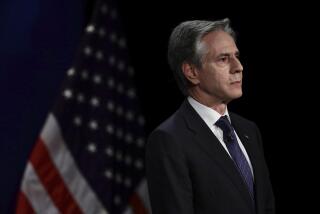Russia Outraged by U.S. Senate Condition on Aid : Europe: Officials, lawmakers denounce measure tying economic help to troop withdrawal from Estonia.
- Share via
MOSCOW — Russian diplomats and lawmakers reacted with outrage Friday to a U.S. Senate vote linking aid to Russia to the withdrawal of Russian troops from Estonia by Aug. 31.
Senior Russian diplomat Vitaly S. Churkin denounced the U.S. attempt to pressure Russia into removing remnants of the occupying Red Army from its Baltic neighbor as “counterproductive and wrong,” while the lower house of Parliament condemned it as unwarranted meddling in Russia’s affairs.
Foreign Minister Andrei V. Kozyrev said Russia “categorically rejects any linkage” of troop withdrawals to economic aid. Kozyrev said a delegation of Russian lawmakers that left for Washington on Friday would be asked to “talk to the American senators before this thing goes too far.”
President Clinton, during his European visit last week, tried to broker smoother relations between Russia and the Baltic states by calling for Russian troop withdrawals and ethnic tolerance from Baltic citizens. But the past week has brought new unpleasantness between Russia and Estonia, Sweden, Latvia and now the United States.
Russia has about 2,000 troops still stationed on Estonian soil. At a joint news conference with Clinton last week, Russian President Boris N. Yeltsin suddenly announced he would not withdraw the troops by Aug. 31, as Russia had promised, because of “gross violations” of the human rights of Estonia’s large Russian-speaking minority.
Latvia, Lithuania and Estonia have all clashed with Russia over citizenship rights for hundreds of thousands of migrants who settled in the Baltics after the Soviet Union annexed the three nations in the wake of World War II.
The Baltic nations claim that “occupants” who do not speak their language are not entitled to automatic citizenship, while Russia asserts that people who have lived in Estonia and Latvia for decades are being hounded out in what amounts to “ethnic cleansing.”
Prime Minister Carl Bildt of Sweden, which has been monitoring the citizenship issue, said Yeltsin’s claim of gross human rights violations in Estonia is “erroneous and false.” The Russian Foreign Ministry promptly retorted, calling Bildt’s statement “tactless and irresponsible.”
But most of Moscow’s ire has been directed at the United States since the Senate voted, 89-9, on Wednesday to approve a GOP amendment that would suspend most aid to Russia unless it has withdrawn all of its troops from the Baltic states by the August deadline or strikes an agreement for withdrawal. Exempt from the cutoff would be food and other humanitarian aid, student exchange programs and assistance to resettle Russian soldiers.
Clinton, however, could ignore the provision under a waiver that would allow him to continue the aid if he determines it to be in the national security interest.
Although the waiver makes the amendment largely symbolic, it struck a sensitive nationalist nerve--even among Russian liberals.
“Never tell us what we have to do, especially when it concerns our interests,” said Boris G. Fyodorov, the former finance minister who is considered a die-hard pro-Western reformer.
“If Russians are endangered in any of these countries, we shall do (what) Americans do all over the world,” he said, brandishing an index finger. “We shall be learning from the American democratic tradition how to send troops to some places. If you do it, why can’t we do it?”
A great power must defend its threatened citizens and its interests, whether in Grenada or Haiti or Tallinn, the Estonian capital, Fyodorov and other lawmakers said.
“I spent seven years in Soviet prisons, and there were Estonians among my cellmates,” said former dissident and lawmaker Mikhail M. Molostovov. “We fought together for freedom and democracy. . . . And now, it is such a shocking, unpleasant surprise” to see the Estonians adopt “unjust” anti-Russian laws.
Estonia welcomed the Senate vote. At a news conference in Moscow on Friday, Vello Saatpalu, chairman of the Estonian Parliament’s foreign affairs committee, said that, besides the 2,000 Russian troops, Estonia has 12,000 to 13,000 retired Russian officers living on its soil--a potentially destabilizing force in a nation of 1.5 million.
About 40,000 people have been naturalized as Estonian citizens, 30,000 have applied for Russian citizenship, and about 80,000 non-Estonians have left the country in the past four years, Saatpalu said. More than half a million non-Estonians were living in Estonia at the time of independence in 1991.
Sharpening tensions further this week were reports in Russian media that Estonian President Lennart Meri and former Prime Minister Mart Laar had sent greetings to a reunion of Estonian veterans of the Nazi SS division.
The Russian foreign minister called the congratulatory message “blasphemy” and said the Estonian SS division had been responsible for the mass extermination of civilians.
Saatpalu said the Estonian SS division had been hastily formed as Hitler’s army collapsed to defend against the invading Red Army. He said the allegations of massacres were “lies, brazen lies.”
Despite these frictions, Russian and Estonian sources said that planning is continuing for a meeting between Meri and Yeltsin that Clinton had requested in hopes of resolving the conflict. But Russia is dissatisfied with a citizenship bill proposed by Latvia, and a scheduled visit by Russian Prime Minister Viktor S. Chernomyrdin to Riga may be canceled, officials said.
The last Russian troops are expected to leave Latvia on schedule by Aug. 31. Russia withdrew the last troops from Lithuania last August.
More to Read
Sign up for Essential California
The most important California stories and recommendations in your inbox every morning.
You may occasionally receive promotional content from the Los Angeles Times.













